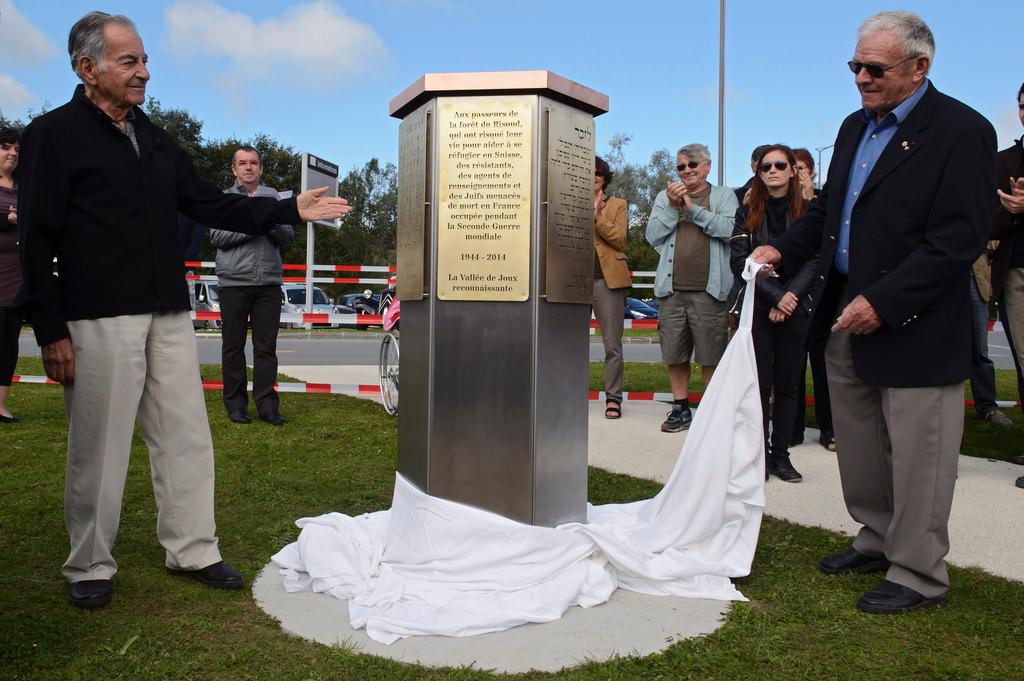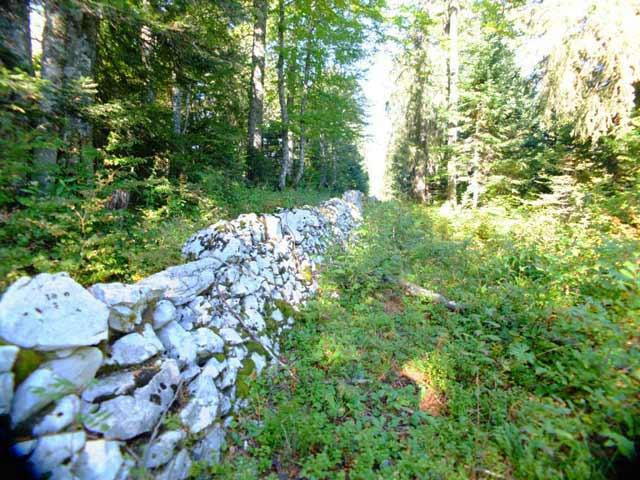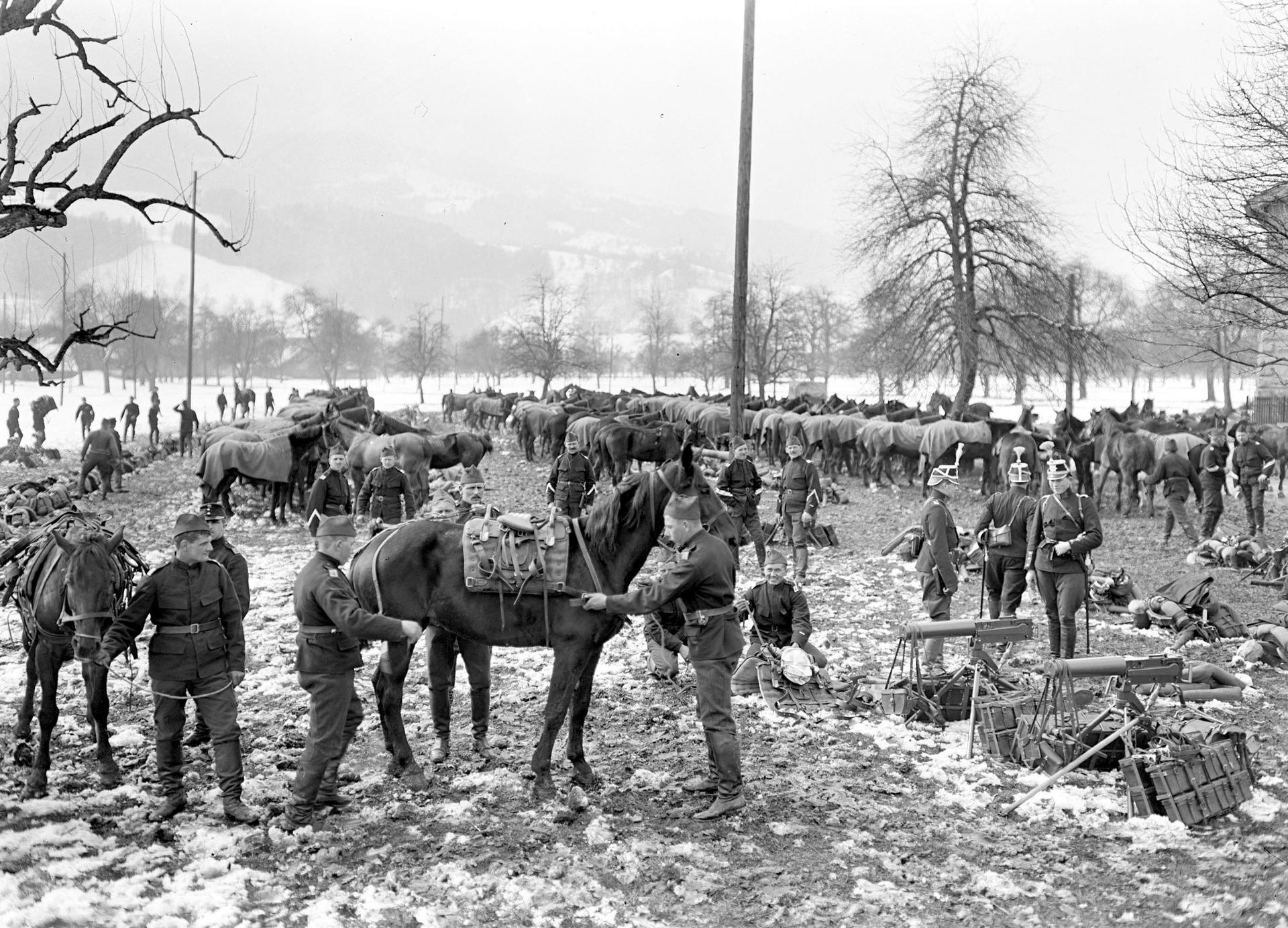Wartime ‘people smugglers’ finally feted as heroes

A small group of young men and women in Switzerland and occupied France defied the Nazis by smuggling weapons, microfilm and Jews across a vast forest separating the two countries. More than 70 years later, a memorial has been unveiled in their honour.
“We transported grenades, gunpowder and microfilm … lots of microfilm,” says Frenchman Bernard Bouveret, the last surviving smuggler to carry out these covert activities in the Risoux forest in the Vallée de Joux, canton Vaud. “In 1942 and in 1943 we smuggled lots of people – resistance fighters, Jews and others on the run who needed to reach Switzerland to save their skin.”
Now 90, Bouveret was just 16 when in 1941 Swiss spy and family friend Fred Reymond asked him whether he’d like to help the Swiss Secret Service. Ashamed by the German occupation, he jumped at the chance “to do something against the Germans”.
By the end of the war, the 15 or so smugglers – known locally as “passeurs” – are reckoned to have saved hundreds of lives, particularly after 1942, when Hitler launched plans to exterminate all Jews in Europe. They worked with a wider network of resistance fighters, spies and ordinary civilians intent on defying the Nazis.
As a fit young wood-cutter who grew up next to Risoux forest, Bouveret had the ideal cover. But it wasn’t easy keeping up the disguise as “it was important that [the German soldiers] saw us” working during the daytime. With his day’s work over, Bouveret was free to cross the border at night – under the noses of the Germans garrisoned barely 100 metres from his house in the village of Chapelle-des-Bois in France.
To carry out their highly risky work and escape capture, the smugglers relied on their knowledge of the maze of trails and the dozen or so cliff entrances to the enormous forest which the authorities rarely used.
But they weren’t always lucky. “If the Germans stopped you during daylight, they’d check your papers, but if it was at night, they’d shoot on sight,” Bouveret says. “A friend of mine was killed at 4am after being hit in the knee with an explosive round. He died in the snow.”
Swiss challenges
Although those making the crossing with the smugglers often had little to lose, Risoux forest was far from a safe haven. Bouveret said he used to “breathe a little easier” after crossing into Switzerland over the waist-high stone boundary wall that still runs the length of the forest, but entering Swiss territory brought its own problems.

Swiss customs officers had orders to arrest fugitives they found at the border and send them back. In fact, refugees had to get at least ten kilometres inside Swiss territory before they could register to stay for the remainder of the war in internment camps for illegal foreigners.
Bouveret was the first link in an extensive Swiss and French chain of sympathisers that made this happen. Fugitives he delivered across the Swiss border hid with host families, before boarding trains that would take them further into the country, where they could finally seek asylum.
His covert activities ended when the Gestapo, the German secret police, finally caught up with him in 1943. They had already arrested Bouveret’s father Jules – also a smuggler – after his stepmother was tricked into giving the game away to a French agent working for the Nazis. Luckily, says Bouveret, his stepmother didn’t know the full extent of his operations, just that he went to Switzerland “because I’d bring back coffee or chocolate and sometimes tobacco for people in the village. But she didn’t know … that I was working for the Swiss secret service.”
After interrogation in France, father and son were sent to Dachau concentration camp in Germany, where they stayed until freed by the Americans in 1945.
Memorial
Despite this apparent selfless bravery, after the war the smugglers were shunned, accused of charging money for their services and profiteering by smuggling contraband (see box).
Today, there’s a growing appreciation for what the authorities at the time viewed as civil disobedience. In 2009, a federal commission recognised more than 100 Swiss wartime activists – including Bouveret’s recruiter Fred Reymond – who were “wrongly” fined, imprisoned or ostracised for their actions.
In an effort to set the story straight at a local level, the authorities in Vallée de Joux have unveiled a memorial to the Risoux forest smugglers.
For wartime survivor Walter Reed, a guest of honour at the memorial ceremony in the lakeside hamlet of Abbaye, the forest smugglers were nothing short of heroes. But he’s also convinced that many other “very dedicated young Swiss people” were equally brave and deserve to be remembered for saving lives in France, rather than “staying home in Switzerland in safety and in comfort”.
As a Jewish teenager, he fled the Nazis to Belgium after being arrested during Kristallnacht in 1938. Once Germany invaded Belgium, he escaped to France, finally seeking shelter at the Chateau de la Hille near Toulouse, along with dozens of other children.
While Reed, now 90, managed to get a visa for the United States and leave France in August 1941, it wasn’t until 1997 that he learned that 25 of his friends at the chateau had crossed into Switzerland through the Risoux forest to escape deportation to Nazi death camps.
‘Real heroes’
Reed says his fellow survivors owed their lives to the volunteer Swiss Red Cross “caretakers” at the chateau, particularly 24-year-old Anne-Marie Piguet. Her father was a Risoux forester, so she used her knowledge and contacts in the Vallée de Joux to take eight children across occupied France and through Risoux forest into Switzerland, he explains.
Describing Piguet as a “revolutionary” individual, Reed says she took huge risks by shepherding the children at different times from the chateau to the forest, a 700-kilometre journey. Once at the forest’s edge, Piguet coordinated the border crossings with three sisters from the Cordier family in Chapelle-des-Bois.
From a chalet overlooking the Vallée de Joux lakeside where the memorial now stands, Reed says Swiss people like Piguet and the Cordier sisters are the “real heroes” of that era – “not only those on the border in the Risoux, but all the other Swiss people who came to take care of other people’s children. These Swiss people are heroes”.
Charges of profiteering
While Bouveret insists that “very few” people paid him for smuggling them across the border, the suspicion persisted that he and other smugglers had made a fortune from selling contraband – banned goods – during the war.
It’s a charge Bouveret denies but one that was hard to dodge, since smugglers carried illegal goods to put the Germans off the scent in case they were caught. An empty-handed smuggler would have aroused suspicion, says Joel Reymond of the Passeurs de Mémoire association, whereas “if you got caught with chocolate and tobacco on you, you were a smuggler and you got a fine”.
For Reymond – whose association has pushed for official recognition for the smugglers – this was why people “would turn against them at the end of the war, thinking they had got rich during the war with this activity, not knowing that beneath there was some real resistance helping people saving lives”.

In compliance with the JTI standards
More: SWI swissinfo.ch certified by the Journalism Trust Initiative











You can find an overview of ongoing debates with our journalists here . Please join us!
If you want to start a conversation about a topic raised in this article or want to report factual errors, email us at english@swissinfo.ch.